Call us now: (65) 6458-4555
 Back to Services
Back to Services
Inspection for Petrol-driven Vehicles
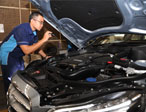
Above Carriage Check: An inspector carries out visual checks on
- Vehicle identity (number plate, engine and chassis numbers)
- Lighting equipment (headlamps, stop lamps, front and rear lamps, direction indicators, etc)
- Bodywork
- Vehicle modification/accessories
- Road wheel and tyres
- General items (seat belts, horn, windscreen, safety devices, etc)
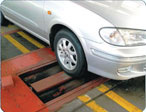
Alignment Test:Checks front wheel alignment. The lateral movement of the front wheels is measured as the vehicle is driven over the side-slip tester.
Brake Test: Determines efficiency of brakes. The brake tester is used to measure brake performance, efficiency and drag force.
Test results are automatically registered. Test instructions and results are displayed on the overhead indicator board.
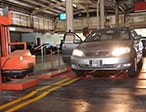
Headlight Test: Determines proper alignment and focus of headlamps. The headlight aimer is used to measure the luminous intensity and the horizontal and vertical aim of each headlamp at high beam.
Exhaust Emission Test: Checks exhaust emission level of petrol driven vehicles. A probe is inserted into the exhaust pipe to collect gas sample for measurement.
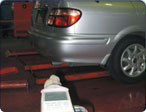
Sound Level Test
The engine is revved and noise emission is measured to determine noise level.
Test results are automatically registered. Test instructions and results are displayed on the overhead indicator board.
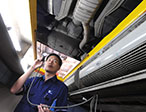
Under Carriage Check: Checks the condition of car parts and components. Vehicle is driven over an inspection pit for visual checks on:
- Chassis
- Exhaust system
- Suspension system
- Steering system
- Brake system
- Leakage
Results
Your vehicle has undergone all the inspection stages. Upon passing the stages, you will be presented with the inspection certificate. Should your vehicle fail an inspection, you will be required to return for re-inspection of your vehicle.

